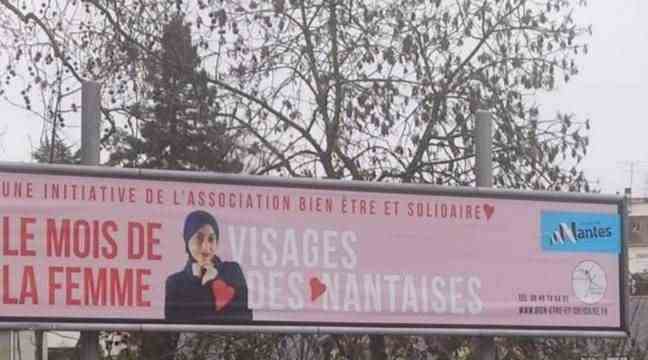“The city of Nantes puts forward a veiled woman, then withdraws the poster in disaster. Promoting the veil is a political fault, an attack on secularism. “The tweet of Laurence Garnier, leader of the Nantes opposition (LR) set fire to the powder this Thursday on social networks, around a subject which is already agitating the presidential campaign. All day, messages have pinned the socialist municipality, asking him in particular to explain himself on this poster, stuck on a panel in the city of Nantes, relayed thousands of times.
It shows the face of a veiled woman alongside the city’s logo. “Choosing a veiled woman, symbol of submission, for the month of the woman, here is where we are in Nantes”, was moved the municipal councilor LR Foulques Chombart de Lauwe. A controversy which echoes that aroused a few months ago by a Council of Europe campaign.
An “internal error”
Asked by 20 minutes, the town hall of Nantes speaks for its part of an “internal error, of a technical nature”. According to the city, this poster (yet printed and pasted by the services) had nothing to do with this panel, normally reserved for association projects subsidized by the town hall, which is not the case for this one. This display “was made outside the usual procedures, it also presents a logo which does not correspond to our visual charter”, adds the town hall, which specifies that it only concerned a single panel, since covered.
“While waiting for a better understanding of how this error could have occurred, we have no lesson to receive on secularism, and certainly not from elected officials who supported the Manif pour tous, indicates Bassem Asseh , first deputy to the city of Nantes. Can a community promote a religious sign? Of course not”, continues the elected official who accuses the right of “jumping on the slightest subject to fire all wood, in an electoral period where identity issues are very present”.
Organized last year in several shopping centers in the Nantes metropolitan area, the project “Faces of Nantes” is a photo exhibition presenting the portraits and journeys of 50 inhabitants, as part of Women’s Rights Day in March. It does not in fact appear in the entertainment program supported by the city this year. “We receive and study hundreds of grant applications, and this one was not clear,” says Bassem Asseh.

